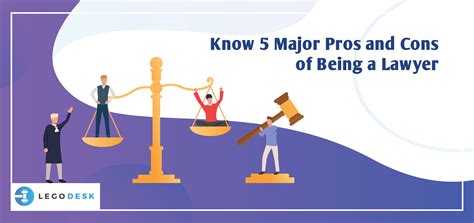Pros And Cons Of Being A Lawyer: Top 11 Factors

Lawyers play a crucial role in the legal system and society as a whole. They represent clients in a variety of legal matters, advocate for justice, and provide legal advice and guidance. But, like any profession, there are advantages and disadvantages to being a lawyer. In this article, we will explore the top 11 factors that make up the pros and cons of being a lawyer.
Pros of Being a Lawyer
1. Opportunities for career advancement
Lawyers have many opportunities for career advancement, including becoming partners in a law firm, judges, or even politicians. With experience and a strong reputation, a lawyer can climb the career ladder quickly.
2. High earning potential
Lawyers typically earn a high salary, especially those who work in large law firms or specialize in a high-demand area of law. According to the Bureau of Labor Statistics, the median annual wage for lawyers in the United States is $126,930.
3. Intellectual stimulation
Lawyers are constantly challenged to think critically and creatively to solve complex legal issues. This intellectual stimulation can be both rewarding and satisfying for those who enjoy problem-solving.
4. Opportunities to make a difference
Lawyers have the ability to make a real difference in people’s lives by advocating for their clients’ rights and defending them against injustice. This can be incredibly rewarding for those who are passionate about social justice and want to make a positive impact on the world.
5. Diverse practice areas
Lawyers have the opportunity to specialize in a wide variety of practice areas, including criminal law, corporate law, environmental law, and family law. This diversity can make the job more interesting and challenging, as well as allow lawyers to find a niche that aligns with their interests and skills.
6. Prestige and respect
Lawyers are often seen as prestigious and respected members of society. This can bring a sense of pride and recognition to those who work in the legal profession.
Cons of Being a Lawyer
1. High stress levels
Lawyers often work long hours, face tight deadlines, and deal with high-pressure situations. This can lead to chronic stress, anxiety, and burnout if not managed properly.
2. High workload
Lawyers are often expected to handle a high workload, with multiple cases and clients to manage simultaneously. This can result in a lack of work-life balance and make it difficult to maintain personal relationships and hobbies outside of work.
3. Ethical dilemmas
Lawyers are often faced with ethical dilemmas that can be challenging to navigate. They must balance their duty to their clients with their duty to the legal system and society, which can lead to difficult decisions and moral ambiguity.
4. High educational requirements
Lawyers are required to complete extensive education and training before they can practice law. This can be time-consuming and expensive, and may discourage some from pursuing a legal career.
5. High competition
Lawyers face high competition in the job market, with many law school graduates vying for a limited number of positions. This can make it difficult to secure a job immediately after graduation, and may require additional networking and experience-building efforts.
6. Negative public perception
The legal profession is often viewed negatively by the public, with many people perceiving lawyers as greedy, ruthless, and untrustworthy. This can be disheartening for those who work hard to uphold the law and provide quality legal representation to their clients.
Conclusion
Being a lawyer has its pros and cons, and it’s important to weigh these factors carefully before committing to a legal career. While lawyers have the opportunity to make a real difference in people’s lives and earn a high salary, they also face high levels of stress, ethical dilemmas, and negative public perception. Ultimately, the decision to become a lawyer should be based on careful consideration of personal interests, values, and goals.
FAQs
What are the different types of lawyers?
There are many different types of lawyers, including criminal lawyers, corporate lawyers, environmental lawyers, family lawyers, immigration lawyers, intellectual property lawyers, and more. Each type of lawyer specializes in a specific area of law and has unique responsibilities and challenges.
What skills do you need to be a lawyer?
To be a successful lawyer, you need a combination of legal knowledge, critical thinking skills, communication skills, and interpersonal skills. You must be able to research, analyze, and apply complex legal concepts, as well as communicate effectively with clients, judges, and other legal professionals.
How long does it take to become a lawyer?
It typically takes around seven years to become a lawyer, including four years of undergraduate education and three years of law school. After completing law school, you must pass the bar exam in your state to become licensed to practice law.
What is the average salary for a lawyer?
According to the Bureau of Labor Statistics, the median annual wage for lawyers in the United States is $126,930. However, salaries can vary widely based on factors like location, experience, and area of specialization.
